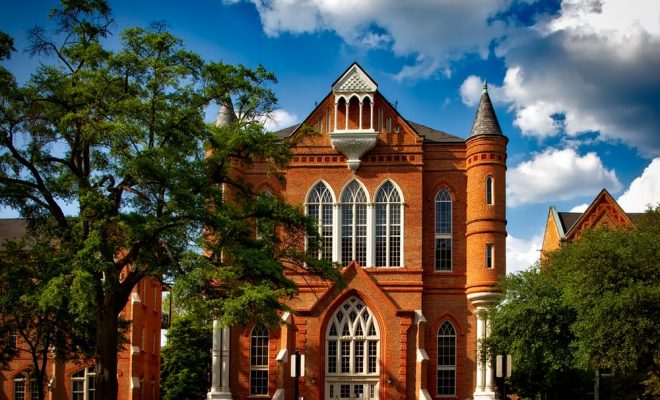2023 Best Bachelor’s in Biomedical Engineering Programs

Click here to find out more about the ranking methodology that we used to compile this list.
Congratulations! If you represent a college or university that is included in this list, please collect your seal below.
Deciding which college to attend can be a daunting task. For many, it will be the most important decision that they make in their lives. To make an informed decision, you have to consider a lot of variables, such as cost of attendance, financial aid, student/teacher ratio, academics, student life, and more. These factors will either positively or negatively impact the quality of education that you receive.
Do you want to acquire a bachelor’s degree in biomedical engineering, but don’t know what institution you should attend? Well, if you are as ambitious as I was in my late teens, then you want to attend a top school, instead of an average or mediocre one. Fortunately, we have already done the legwork for you. To help you find the right school for your interests and goals, we’ve compiled a list of 2022’s best bachelor’s in biomedical engineering programs.
What institution did we forget? Leave your thoughts in the comment section below.
At Duke University, learners will receive a solid foundation in STEM while also learning how to carry out experiments. Learners will also become thought leaders in biology and learn how to interpret living data and apply statistics to biology and engineering. Classes consist of:
- Biomedical Imaging and Instrumentation
- Biomechanics
- Electrobiology
- Biomolecular and Tissue Engineering
Johns Hopkins’ bachelor’s in biomedical engineering degree program trains learners to solve problems at the nexus of engineering and biology. With an international perspective, learners learn how to tackle complex biomedical engineering issues along with broader nuances within the healthcare system. This multidisciplinary degree program contains classes such as:
- Biomedical Modeling and Design
- BME in the Real World
- Molecules and Cells
- Biomedical Systems and Controls
At Stanford, learners benefit from a multidisciplinary degree program that comes out of a partnership between the Schools of Engineering and Medicine. Learners learn how to integrate life sciences and scientific discovery in a way that benefits our healthcare system. Indeed, learners study everything from environmental quality to policy. Classes consist of:
- Systems Biology
- Physical Biology of Macromolecules
- Systems Physiology and Design
- Biosecurity and Bioterrorism Response
The George R. Brown School of Engineering at Rice has an impressive BS in biomedical engineering degree. This degree program takes leadership formation seriously and therefore gives its learners real-world experiences and challenges. Learners study abroad, partake in professional mentorships, intern, and much more, along with taking classes such as:
- Bioreaction Engineering
- Biomaterials
- Numerical Methods
MIT’s Department of Biological Engineering has a bachelor’s degree that readies learners to enter research-related fields or graduate/medical school. Graduates have gone on to find rewarding careers with pharmaceutical companies and attend some of the best graduate engineering schools. There are more than a dozen ways to concentrate via MIT’s formal concentrations in:
- Environmental and Toxicological Studies
- Cancer Biology
- Immunoengineering
At Penn, learners can pursue a BS in bioengineering or a bachelor of applied science in biomedical science. While the former is a conventional, engineering-focused degree, the latter is more adaptable and multidisciplinary. Both let learners concentrate via one of these concentration paths:
- Neuroengineering
- Biomedical Devices
- Systems and Synthetic Biology
- Cellular/Tissue Engineering and Biomaterials
Vanderbilt University is a private, research-based school, which serves more than 12,000 learners via its 10 colleges and schools. Vanderbilt, though strong in an array of academic and professional fields, is best known for its engineering school. In Vanderbilt’s BS in Biomedical Engineering degree program, learners will build a foundation in STEM and then investigate the intricacies of biology and biomaterials across a broad scale, from nano to whole bodies. This multidisciplinary degree program is focused and wide-reaching. Learners will take classes such as:
- Systems Physiology
- Circuits I and II
- Analysis of Data
- Medical Instrumentation
Situated in Upper Manhattan, Columbia University is an Ivy League institution, and one of the most outstanding in the country. Nearly 28,000 learners attend Columbia and are enrolled in one of its 20 schools, including the legendary Fu Foundation School of Engineering and Applied Sciences. Columbia’s BS in biomedical engineering degree is steeped in the physical and chemical sciences. With an emphasis on the integration of biomedical engineering and physiology, learners become experts in the relationship among engineering, biology, and medicine. Learners also get real-life experience via Columbia’s lab modules, which consist of:
- Computational Teaching Lab
- The Undergraduate Wet Lab
- The Design and Fabrication Capabilities Lab
Whether learners want to work on a career in biomedical engineering, a related field, or go on to receive a professional degree in medicine, dentistry, or law, the BS in biomedical engineering degree program at Washington University will help them get there. After building a foundation in STEM, learners will tailor their degree program to concentrate on an area of interest. Required classes consist of:
- Biomechanics
- Quantitative Physiology
- Bioengineering
- Transport Phenomena in Biomedical Engineering
The University of California at San Diego has a BS in biomedical engineering degree program that brings particularly creative approach to the study of bioengineering. While it gives learners the breadth and depth necessary for becoming fluent in the relationship between engineering and biology, learners engage in multidisciplinary teams and learn how to become innovators. At UCSD, learners can concentrate in one of four areas:
- General Bioengineering
- Biotechnology
- Bioinformatics
- BioSystems
Learners are taught how to design systems, devices, and instruments that save lives with a BS in biomedical engineering degree. This multidisciplinary degree program readies learners for lucrative careers in the biotech sector or medical school. It gives an introduction to engineering materials with biological surfaces. Classes consist of:
- Introduction to Molecular Genetics
- Biochemistry
- Modern Physics
- Instrumental Analysis
Stevens Institute of Technology is nationally rated in numerous categories and is considered to be an outstanding return on investment.
The Irvine campus is a research institution known for its work in medicine, law, and engineering. More than 32,000 learners attend UC Irvine. Learners who receive a BS in biomedical engineering degree at UCI also have the chance to receive their pre-med degree. For learners who do not plan to attend medical school, UCI has a traditional degree as well. Programs provide plenty of lab experience and deliver thorough training in biological medicine and engineering.
At the University of Michigan, learners get a strong foundation in biomedical engineering fundamentals. While they are studying biology, they will also focus on the design and optimization of engineering advancements. There are three BS concentrations to select from:
- Biomaterials and Biotechnology
- Bioelectrics and Biomedical Imaging
- Biomechanics and Medical Device Development
This BS in biomedical engineering degree from Rochester trains learners to enter an array of industries or graduate schools upon graduation. Graduates have completed award-winning research and attended prestigious medical schools. And at Rochester, learners can become highly focused. There are four ways to concentrate:
- Biomechanics
- Biosignals and Biosystems
- Cell and Tissue Engineering
- Medical Optics
Unique to UR is the chance for juniors and seniors to obtain full funding for their fifth year of study. This is called the Take Five Scholars degree program, and it gives learners the chance to experience advanced education and research work. It also mimics graduate study for learners who hope to work on a master’s or doctoral degree.






